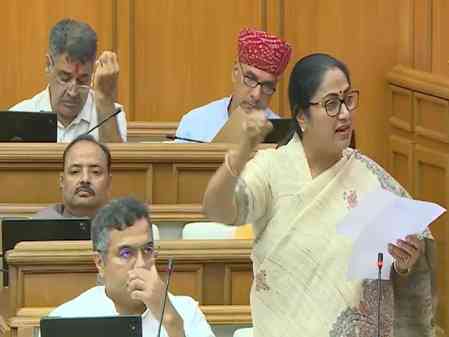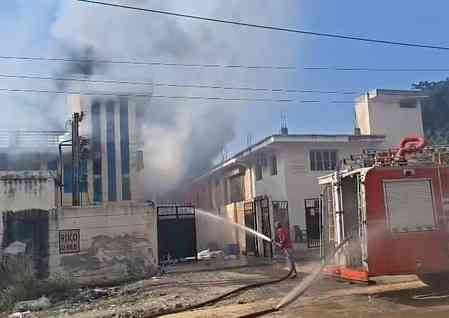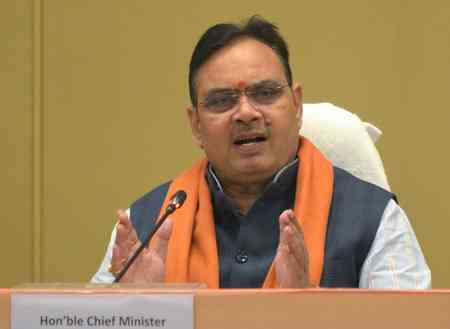Delhi Assembly passes Bill to set up GST Appellate Tribunal
Highlighting a 7 per cent increase in revenue in the Delhi government’s first five months, Chief Minister Rekha Gupta on Friday led the legislators in passing two key GST Bills in the Assembly to pave the way for establishing a GST Appellate Tribunal and launching an amnesty scheme.

New Delhi, Aug 8 (IANS) Highlighting a 7 per cent increase in revenue in the Delhi government’s first five months, Chief Minister Rekha Gupta on Friday led the legislators in passing two key GST Bills in the Assembly to pave the way for establishing a GST Appellate Tribunal and launching an amnesty scheme.
CM Gupta highlighted that Delhi’s GST and VAT collections have grown significantly — Rs 15,535 crore in just the first five months of FY 2024–25, up from Rs 14,500 crore under the previous administration during the same period.
“A seven per cent increase in revenue in just five months is proof that these reforms are working and that the people of Delhi are responding positively to transparent governance,” she said.
The Chief Minister had introduced on Thursday two legislative packages in the Assembly related to about 60 amendments approved in GST Council meetings and include measures like establishing the GST Appellate Tribunal and launching an amnesty scheme.
The amendments were introduced through two focused legislative packages. The first package, comprising 45 amendments approved in GST Council meetings held in July 2023, October 2023, and June 2024, focused on extending ITC timelines, simplifying registration and return filing, establishing the GST Appellate Tribunal, and launching an amnesty scheme for relief on interest and penalties.
The second package, passed during the 55th GST Council Meeting in December 2024, included 14 amendments aimed at strengthening enforcement and procedural clarity -- such as penalties for non-compliance in track-and-trace systems, clarified ISD credit distribution, treatment of municipal funds, and streamlined appeal processes.
The Delhi Goods and Services Tax (Amendment) Bill, 2025 (Bill No. 04 of 2025) and the Delhi Goods and Services Tax (Second Amendment) Bill, 2025 (Bill No. 05 of 2025) were introduced on Thursday but were discussed and passed on Friday.
Collectively, these reforms extend ITC claim periods, lower the pre-deposit for appeals from 10 per cent to 7 per cent, improve dispute resolution, and introduce machine-tracking enforcement mechanisms particularly in sectors like gutkha manufacturing, where the Centre has mandated unique identifiers on each packet for accountability.
“Earlier, companies could not be traced for how much gutkha was being produced or sold. Now, with machine tracking and unique identifiers, the government will ensure full transparency,” the CM explained in the House.
The GST Amnesty Scheme alone has led to Rs 218 crore in collections for Delhi as of March 31. 2025 a clear sign of taxpayer responsiveness to the reforms, she said.
The CM also addressed misconceptions about Delhi’s revenue authority, stating: “Delhi is a Union Territory. Income tax, Customs, and corporate taxes are handled by the Centre not the Delhi Government. We are responsible for GST, VAT, Excise, and Stamp Duty.”
She thanked the Central government for continuing to bear the costs of law enforcement, pensions, Metro operations, and major urban development schemes.
“From Delhi Police salaries to pensions worth Rs 6,000 crore, from Metro Rail to Central Universities Delhi receives more than its due. It is the Centre that ensures Delhi runs smoothly, regardless of politics,” she stated.
The CM also praised the Revenue Department for its dedicated execution of these complex reforms and reaffirmed her government’s vision for a compliant, efficient, and business-friendly taxation environment. “The Delhi Government under my leadership is committed to creating a robust tax ecosystem that supports both governance and growth,” she concluded.
--IANS
rch/pgh



 IANS
IANS 










